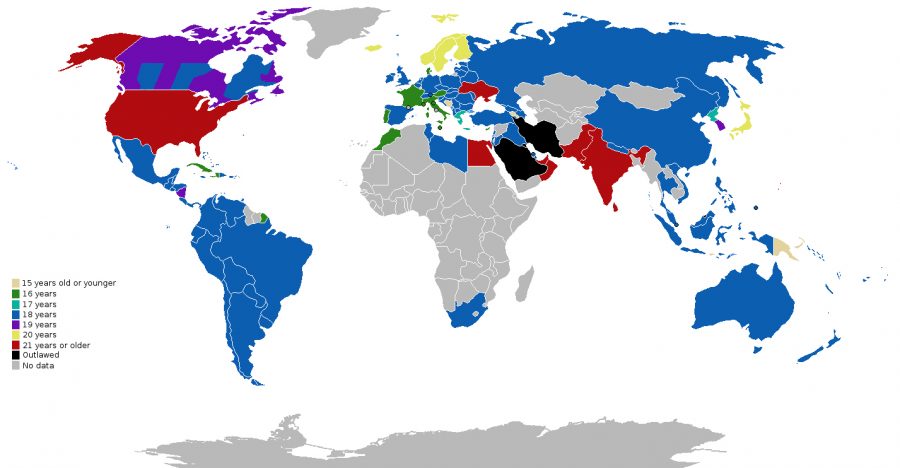Lowering drinking age to 18 would make people safer
Evidence suggests it would reduce accidents; adults should have right to choose to drink alcohol
The U.S. has one of the highest drinking ages in the world but a proportionally high number of accidents involving alcohol.
October 29, 2018
A drinking age of 21 is unjust, inconsistent and ageist.
The drinking age before 1984 was under state jurisdiction. Some states like Washington had a drinking age of 21, and some, like Idaho, had a drinking age of 18. Most people would agree that WSU’s conveniently small commute to Idaho greatly contributed to WSU’s lasting “party school” reputation.
There was a huge amount of drunk driving incidents caused by 18-year-olds crossing state borders to legally drink, according to Bureau of Justice statistics.
This prompted the Ronald Reagan administration to enact the 1984 National Minimum Drinking Age Act, which bullied states into complying to a federal drinking age of 21 by threatening to pull funding for state highways.
However, this is a huge misattribution to the success of the act. Rather than the increase in age, it was the change to a standardized age that made an impact. Lowering the federal drinking age to 18 would have had the same effect of eliminating the reason to travel to legally drink.
Two years prior to the drinking age change, there was already a trending decrease in the number of drinking fatalities, according to the National Institute of Health.
“I’m not sure if the age is the impact point in the drinking but more so the decision-making is going to be responsible, because it’s more likely that a person aged 21 is going to be more responsible,” said Steve Hansen, WSU Police assistant chief.
This is further corroborated with the general increase in safety in the 1980s. Standardized driver side airbags were introduced, and other vehicle safety features including better brakes and an increase in the use of seatbelts all contributed to a decrease in fatalities, according to Vox.
From a psychological standpoint, the illegality of underage drinking merits its own appeal, referred to as reactance.
“Significantly more underage students drank compared to those of legal age … the increase in purchase age appears to have been not only ineffective but actually counterproductive, at least in the short run,” according to a 1988 Indiana University study of over 56 colleges measuring the change in drinking age.
Young adults, like standard economic theory, are fairly opportunistic. Since they don’t have the certainty of being able to easily pop into a store when alcohol is accessible, it’s copiously binged when it is available.
This only inflames the problem and actively works against the purpose of the act.
Binge drinking is much more harmful to the body than drinking in moderation. It can cause neural toxicity and lead to alcohol poisoning.
“Young people consume more than 90 percent of their alcohol by binge drinking,” according to the National Institute of Alcohol Abuse and Alcoholism.
Despite the illegality of underage drinking, it’s ubiquitous — especially in college. Parents don’t blink when a student mentions going to a party with beer because it’s an assumed convention.
Instead of prosecuting college students for conforming to the norm, we should spend those resources on better alcohol education, better public transportation or self-driving cars.
Many harms are associated with having a high blood alcohol concentration in a short time. There are also a host of other harms associated with drug interactions.
The question at hand is not whether drinking is bad for an 18-year-old body and whether an 18-year-old is developed enough to be responsible for making the decision of what goes into their body.
If as a country we’ve decided 18-year-olds are incapable of making that decision, they shouldn’t be legally bound to contracts or be charged as an adult or have any of the other precarious privileges and obligations that come with being an adult.
The injustice lies in where the federal government has drawn the line of adulthood. Even the term “minor intoxication” is a misnomer, because those in question are not minors — they are legal adults.
Whether your brain is still developing or not, we have decided as a country that the age in which you can govern your own decisions and actions is 18. By that logic, 18-year-olds should be able to make a decision about what to put in their bodies.
Despite being the land of the free, we have one of the highest drinking ages in the entire world. Just like the metric system, basically every other country has adopted a drinking age of 18 or lower.
In the U.S., 31 percent of road traffic deaths involve alcohol. This percentage is higher than many countries with a drinking age lower than 21. In France it is 29 percent, the United Kingdom 17 percent, Germany 9 percent, China 4 percent and Israel 3 percent, according to the World Health Organization.
More than 100 college presidents across the nation have signed the Amethyst Initiative, a plea to reevaluate the drinking age, and I implore WSU President Kirk Schulz to do the same.
The legal drinking age is not a particularly pressing matter, but that doesn’t stop it from making the situation worse, being misattributed to success and patronizing to legal adults.
Ultimately, a drinking age of 18 is safer for the individual, safer for the community and effectively already in practice. Legalizing it can only help.








